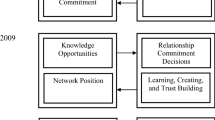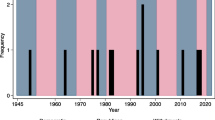Abstract
The normative power Europe concept has greatly enriched the academic debate on what the EU is (should be), what it does (should do) and what impact it has (should have). However, various theoretical, methodological and empirical issues remain insufficiently addressed. This article will address two issues that have mostly been neglected: the perspective of the norm takers (in line with this special issue) and the market norms of the EU. The first section elaborates on these two issues, relying on recent advances in the literature and specifically the contributions by Damro (J Eur Publ Pol 19(5):682–699, 2012) and Rosamond (Brit J Polit Int Relat 16(1):133–148, 2013). Against this background, the second section examines the controversial EU trade negotiations with India. Specifically, this empirical part section focuses on how market liberal norms (government procurement) and cosmopolitan norms (human rights) are being promoted and received. We conclude that in the eyes of the EU, trade agreements could be a means to mitigate partners’ opposition and an eventual stepping stone for successful off-take of international social standards and multilateral procurement liberalization regulations by its partner countries. But, partner countries might not necessarily espouse the EU’s interest-led motivation and lend support to the EU’s desire to effuse multilateral norms through trading agreements. The case study on EU-India trade talks illustrates this, highlighting the divergence between the EU and Indian perspectives and demonstrates India’s lack of enthusiasm to adopt the EU’s preferred model for liberalization.
Similar content being viewed by others
Notes
We would like to thank all the participants to the ‘Normative Power Europe?’ workshop at the University of Canterbury, in particular the editors of this special issue, as well as Fabienne Bossuyt, Lore Van den Putte and Hoang Hai Ha, for their feedback and suggestions on earlier versions.
See http://www.ilo.org/declaration/thedeclaration/lang--en/index.htm. India has not ratified the ILO conventions related to discrimination and child labour.
References
Aggestam L (2008) Introduction: ethical power Europe? Int Aff 84(1):1–11
Bailey D, Bossuyt F (2013) The European Union as a conveniently-conflicted counter-hegemon through trade. J Contemp Eur Res 9(4):560–577
Björkdahl A, Chaban N, Leslie J, Masselot A (eds) (2015) Importing EU norms? conceptual framework and empirical findings. Springer, Berlin
Börzel T, Risse T (2012) From Europeanisation to diffusion: introduction. West Eur Polit 35(1):1–19
Bossuyt F (2009) The social dimension of the new generation of EU free trade agreements with Asia and Latin America: ambitious continuation for the sake of policy coherence. Eur Foreign Aff Rev 14(5):703–742
Business Standard (2012) FTA with EU to benefit textile exports, 11 July. http://www.business-standard.com/india/news/ftaeu-soon-to-benefit-textile-exports/480043/. Accessed on 02 Sept 2014
Chandler D (2003) Rhetoric without responsibility: The attraction of ‘ethical’ foreign policy. Brit J Polit Int Rel 5(3):295–316
Campling L, Harrison J, Richardson B, Smith A (2014) Working beyond the border? a new research agenda for the evaluation of labour standards in EU trade agreements. A new research agenda for the Evaluation of labour standards in EU trade agreements (April 4, 2014). Warwick School of Law Research Paper, (2014/03)
Cox R (1981) Social forces, states and world order: beyond international relations theory. J Int Stud 10(2):126–155
Damro C (2012) Market power Europe. J Eur Publ Pol 19(5):682–699
Diez T (2005) Constructing the self and changing others: reconsidering ‘normative power Europe’. Millennium: J Int Stud 33(3):613–636
Diez T (2013) Normative power as hegemony. Coop Confl 48(2):194–210
Duchêne F (1973) The European community and the uncertainties of interdependence. In: Kohnstamm M, Hager W (eds) A nation writ large?foreign-policy problems before the european community. Macmillan, London, pp 1–21
European Parliament (2009) An EU-India FTA, Report no.: 2008/2135/INI (Brussels March 26). http://www.indianet.nl/pdf/ep090312.pdf. Accessed on 02 Sept 2014
European Parliament (2011) Report on the EU as a global actor: its role in multilateral organisations, Committee on Foreign Affairs (rapporteur: María Muñiz de Urquiza), Report no: 2010/2298 (INI), Brussels, 29 April, paragraph 4
European Commission (2006) Global Europe: Competing in the World. http://trade.ec.europa.eu/doclib/docs/2006/october/tradoc_130376.pdf. Accessed on 02 Sept 2014
European Commission (2008) EU-India FTA Negotiations: EC Key Messages, January-February
European Commission (2010) Report on progress achieved on the Global Europe strategy, 2006-2010, Commission Staff Working document, SEC(2010) 1268/2 (Brussels). http://trade.ec.europa.eu/doclib/docs/2010/november/tradoc_146941.pdf. Accessed on 02 Sept 2014
Gupwell D, Gupta N (2009) EU FTA negotiations with India, ASEAN and Korea: the question of fair labour standards. Asia Eur J 7(1):79–95
Jörgensen KE (ed) (1997) Reflective approaches to European Governance. Houndmills, Palgrave
Karat P (2012) A treaty for the rich. Morning Star. 25 May
Khorana S, Asthana A (2014) EU FTA negotiations with India: the question of liberalization of public procurement. Asia Eur J. doi:10.1007/s10308-014-0369-7
Khorana S, Garcia M (2013) European Union-India FTA: one step forward, one back? J Common Mark Stud 51(4):684–700
Khorana S, Garcia M (2014) Procurement liberalization diffusion in EU agreements: signalling stewardship? J World Trade 48(3):481–500
Khorana S, Perdikis N (2010) EU-India free trade agreement: deal or No deal? South Asia Econ J 11(2):181–206
Khorana S, Subramanian S (2012) Potential accession to the WTO government procurement agreement: a case study on India. J Int Econ Law 15(1):287–309
Khorana S, Perdikis N, Kerr WA, Yueng M (2011) The Era of bilateral agreements: the EU and India in search of a partnership. Elgar Publishing, Cheltenham, pp 1–225
Krishna P (2009) In: Lester S, Mercurio B (eds) The economics of PTAs in bilateral and regional trade agreements- commentary and analysis. Cambridge University Press, Cambridge, pp 11–27
Lamy P (2002) Stepping stones or stumbling blocks? The EU’s approach towards the problem of multilateralism vs regionalism in trade policy. World Econ 25(10):1399–1413
Langan M (2012) Normative power Europe and the moral economy of Africa–EU ties. New Polit Econ 7(3):243–270
Manners I (2000) Normative power Europe: a contradiction in terms? Copenhagen Peace Research Institute, Working paper 38/2000
Manners I (2002) Normative power Europe: a contradiction in terms? J Common Mark Stud 40(2):235–258
Manners I (2006) The European Union as a normative power: a response to Thomas Diez. Millennium J Int Stud 35(1):167–180
Manners I (2008) The normative ethics of the European Union. Int Aff 84(1):45–60
Manners I (2011) The European Union’s normative power: critical perspectives and perspectives on the critical. In: Whitman R (ed) Normative power Europe: empirical and theoretical perspectives. Basingstoke, Palgrave, pp 226–247
Manners I, Whitman RG (2003) The ‘difference engine’: constructing and representing the international identity of the European Union. J Eur Publ Pol 10(3):380–404
Maull HW (1990) Germany and Japan: the New civilian powers. For Aff 69(5):91–106
Meincke B (2013) The EU-India-FTA: Development and Growth for Each and Everybody?Macroeconomics and Gender. Report for Heinrich Boll Stiftung, New Delhi. http://in.boell.org/2013/12/10/eu-india-fta-development-and-growth-each-and-everybody-macroeconomics-gender. Accessed on 02 Sept 2014
Meunier S, Nicolaidis K (2006) The European Union as a conflicted trade power. J Eur Pub Pol 13(6):906–925
Morlino L (2003) Democrazie e Democratizzazioni. Bologna, Italy Mulino, pp 18–31
Nicolaïdis K, Whitman R (eds) (2013) Special Issue on Normative Power Europe. Cooperation and Conflict 48(2)
Orbie J (2008) A civilian power in the world? instruments and objectives in EU external policies. In: Orbie J (ed) Europe’s global role. Ashgate, Aldershot, pp 1–34
Orbie J (2011) Promoting labour standards through trade: normative power or regulatory state Europe? In: Whitman R (ed) Normative power Europe: empirical and theoretical perspectives. Palgrave, Basingstoke, pp 161–187
Rosamond B (2013) Three ways of speaking Europe to the world: markets, peace, cosmopolitan duty and the EU’s normative power. Brit J Polit Int Relat 16(1):133–148
Sen A (2013) EU won’t get further access to government business. The Economic Times. http://articles.economictimes.indiatimes.com/2012-04-02/news/31275525_1_government-procurement-karel-de-gucht-meeting-with-eu-trade. Accessed on 02 Sept 2014
Siles-Brügge G (2014) EU trade and development policy beyond the ACP: subordinating developmental to commercial imperatives in the reform of GSP. Contemp Polit 20(1):49–62
Sjursen H (ed) (2006) Civilian or military power? the European Union at a crossroads. Routledge, London
Storey A (2006) Normative power Europe? economic partnership agreements and Africa. J Contemp Afr Stud 24(3):331–346
Whitman RG (2013) The neo-normative turn in theorising the EU’s international presence. Cooperation and conflict 48(2):171–193
Witchterich C, Menon-Sen K (2009) Trade liberalisation, gender equality: The case of the contested EU-India FTA. WIDE Paper HB Stiftung, Brussels, Policy Space. http://www.in.boell.org/downloads/Trade_Liberalisation__Gender_Equality_Policy_Space_the_case_of_the_contested_EU_India_FTA_.pdf Accessed 5 June 2014
Young AR, Peterson J (2006) The EU and the new trade politics. J Eur Publ Pol 13(6):795–814
Zahrnt V (2005) How regionalisation can be a pillar of a more effective world trade organization. J World Trade 39(4):671–699
Author information
Authors and Affiliations
Corresponding author
Rights and permissions
About this article
Cite this article
Orbie, J., Khorana, S. Normative versus market power Europe? The EU-India trade agreement. Asia Eur J 13, 253–264 (2015). https://doi.org/10.1007/s10308-015-0427-9
Published:
Issue Date:
DOI: https://doi.org/10.1007/s10308-015-0427-9




